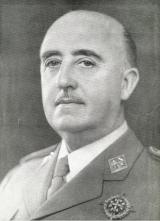Editorial Article 8 -- No Title
Date: 05 December 1892

Francisco Franco Bahamonde (born Francisco Paulino Hermenegildo Teódulo Franco Bahamonde; 4 December 1892 – 20 November 1975) was a Spanish general and dictator who led the Nationalist forces in overthrowing the Second Spanish Republic during the Spanish Civil War and thereafter ruled over Spain from 1939 to 1975. This period in Spanish history, from the Nationalist victory to Franco's death, is commonly known as Francoist Spain.
Born in Ferrol, Galicia, into an upper-class military family, Franco served in the Spanish Army as a cadet in the Toledo Infantry Academy from 1907 to 1910. While serving in Morocco, he rose through the ranks to become a brigadier general in 1926 at age 33. Two years later, Franco became the director of the General Military Academy in Zaragoza. As a conservative and monarchist, Franco regretted the abolition of the monarchy and the establishment of the Second Republic in 1931, and was devastated by the closing of his academy; nevertheless, he continued his service in the Republican Army. His career was boosted after the right-wing CEDA and PRR won the 1933 election, empowering him to lead the suppression of the 1934 uprising in Asturias. Franco was briefly elevated to Chief of Army Staff before the 1936 election moved the leftist Popular Front into power, relegating him to the Canary Islands.
He joined the July 1936 military coup, which, after failing to take Spain, sparked the Spanish Civil War. He commanded Spain's African colonial army and later, following the deaths of much of the rebel leadership, became his faction's only leader, being appointed generalissimo and head of state in 1936. He became recognized as a fascist leader while receiving support from Fascist Italy and Nazi Germany. He consolidated all Nationalist groups into the FET y de las JONS, and developed a cult of personality around his rule by founding the Movimiento Nacional. Three years later the Nationalists declared victory, which extended Franco's rule over Spain through a period of repression of political opponents. His government's use of forced labour, concentration camps and executions after the war led to between 30,000 and at least 200,000 deaths. Combined with wartime killings, this brings the death toll of the White Terror to between 100,000 and 350,000 or more. During World War II, he maintained Spanish neutrality, but supported the Axis powers, damaging the country's international reputation.
During the start of the Cold War, Franco lifted Spain out of its mid-20th century economic depression through technocratic and economically liberal policies, presiding over a period of accelerated growth known as the "Spanish miracle". At the same time, his regime transitioned from a totalitarian state to an authoritarian one with limited pluralism. He became a leader in the anti-communist movement, garnering support from the West, particularly the United States. As the government relaxed its hard-line policies, Luis Carrero Blanco became Franco's éminence grise, whose role expanded after Franco began struggling with Parkinson's disease in the 1960s. In 1973, Franco resigned as prime minister—separated from the office of head of state since 1967—due to his advanced age and illness. Nevertheless, he remained in power as the head of state and as commander-in-chief. Franco died in 1975, aged 82, and was entombed in the Valle de los Caídos. He restored the monarchy in his final years, being succeeded by King Juan Carlos, who led the Spanish transition to democracy.
The legacy of Franco in Spanish history remains controversial, as the nature of his rule changed over time. His reign was marked by both brutal repression, with tens of thousands killed, and economic prosperity, which greatly improved the quality of life in Spain. His style proved adaptable enough to allow social and economic reform, but still centred on highly centralised government, authoritarianism, nationalism, national Catholicism, anti-freemasonry and anti-communism. The contemporaries regarded Franco as a fascist dictator; among scholars, there has been a long-lasting debate whether it is adequate to define Franco's regime as fascist. It has been described in broad definitions, from a traditional military dictatorship to a fascistized yet not fascist or a fully fascist regime.
Leia mais...O dia 4 de dezembro de 1892 foi um domingo sob o signo de ♐. Foi o dia 338 do ano. O presidente dos Estados Unidos foi Benjamin Harrison.
Se você nasceu neste dia, você tem 132 anos de idade. Seu último aniversário foi no dia quarta-feira, 4 de dezembro de 2024, 333 dias atrás. Seu próximo aniversário é no dia quinta-feira, 4 de dezembro de 2025, em 31 dias. Você viveu 48.545 dias, ou cerca de 1.165.087 horas, ou cerca de 69.905.276 minutos, ou cerca de 4.194.316.560 segundos.
Date: 04 December 1892
Grand National Clubs; Lists; Description and History of Sport
Date: 04 December 1892
Road Improvement Association; Executive Committee Meeting
Date: 04 December 1892
BY THE COMMERCIAL CABLE FROM OUR OWN CORRESPONDENT.H.F
Belgian Capitalists' Aid
Date: 04 December 1892
Funeral and Burial at Woodlawn
Date: 05 December 1892
Assembling; Opening Scenes
Date: 04 December 1892
Lecture Programmes
Date: 05 December 1892
Planets' Positions Monthly
Date: 04 December 1892